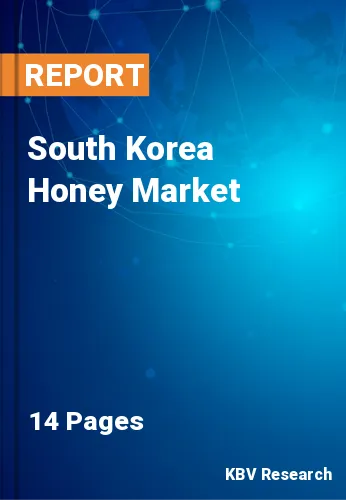The South Korea Honey Market would witness market growth of 13.8% CAGR during the forecast period (2020-2026). Honey is a viscous, and sweet natural substance produced by honey bees. Raw honey collected by beekeepers from bee comb.
It is produced naturally by worker bees using nectar they collect from flowers. They collect the nectar of flowers or from secretions of living parts of plants as food. Then by combining nectar with specific substances enzymatically, they deposit it in a comb to ripen and mature.
South Korea has an ancient tradition of beekeeping and honey production. According to the Korean beekeeping association report, 2019, Honey production in the domestic market has been declined in the past few years in South Korea. This is mainly because of unpredictable climate change and damage to insects by excessive use of pesticides. As free trade agreement was established in the country that partnered with the US, Vietnam, Canada, and New Zealand, it is expected that imports of honey from these countries will increase in the forecast period. The USA accounts for about 51% of imports of honey to South Korea in 2019 and it is the leading supplier.
Korean people have long believed that including natural honey in the diet has many health and nutritional benefits. Although with increasing concern about the risks of obesity and related health issues, the demand for honey has increased exponentially among Korean consumers. They are trying to avoid fat and added sugar in their diet. So honey serves as a healthier alternative for the added sugar. For example, New Zealand exports its Manuka honey to Korea. There is a significant increase in the import of this honey in recent years owing to the strong demand for premium honey amongst Korean consumers. Also, Korean consumers consider the United States imported honey as a trusted origin for both quality and fair value.
The sudden outbreak of Covid-19 has disrupted the export and import in the Korean market. The honey industry has been adversely affected by the COVID-19, not only production but it risks the livelihood of the beekeepers. The complete lockdown in the country resulted in the disruption of the supply chain and transportation. There is a decline in the number of beekeepers as well as bee colonies in South Korea. This has led to a higher dependency on imported honey. As a consequence of this decline, the shortage of pollinators will directly affect agriculture. Though, with the relaxations in the lockdown guidelines, recovery is expected in the market in the near future. It is expected that the condition of the honey market will improve in the coming days.
The quality and price of honey are largely determined by the plants from which bees collect nectar and how is it harvested. Honey is very rich in vitamins and natural minerals. Honey is used in processed foods, beverages, jellies, and jams. The increasing concern about health is one of the factors leading to increased consumption among the health-conscious population. There are various health benefits of honey, thus it is used as an important ingredient in healthcare and beauty products. The American Academy of Pediatrics (AAP) acknowledged honey as a beneficial remedy for respiratory tract infections.
By Application
By Distribution Channel
Our team of dedicated experts can provide you with attractive expansion opportunities for your business.

